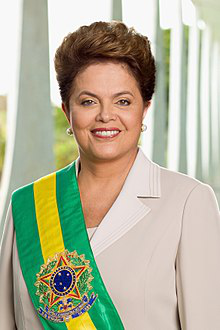

President of Brazil
Dilma Vana Rousseff 14 December 1947 Belo Horizonte, Minas Gerais, Brazil
-
1 January 2011 – 31 August 2016 Suspended: 12 May 2016 – 31 August 2016
Former President of Brazil Her Excellency Dilma RousseffOfficial portrait, 2011President of BrazilIn office 1 January 2011 – 31 August 2016 Suspended: 12 May 2016 – 31 August 2016 Vice President Michel TemerPreceded by Luiz Inácio Lula da SilvaSucceeded by Michel TemerChief of Staff of the PresidencyIn office 21 June 2005 – 31 March 2010PresidentLuiz Inácio Lula da SilvaPreceded by José DirceuSucceeded by Erenice GuerraMinister of Mines and EnergyIn office 1 January 2003 – 21 June 2005PresidentLuiz Inácio Lula da SilvaPreceded by Francisco Luiz Sibut GomideSucceeded by Silas RondeauSecretary of Mines, Energy and Communications of Rio Grande do SulIn office 1 January 1999 – 2 November 2002GovernorOlívio DutraPreceded by Gustavo Eugenio Dias GotzeSucceeded by Luiz Valdir AndresIn office 1 December 1993 – 2 January 1995GovernorAlceu CollaresPreceded by Airton Langaro DippSucceeded by Assis Roberto Sanchotene de SouzaSecretary of Finances of Porto AlegreIn office 1 January 1986 – 24 September 1988MayorAlceu CollaresPreceded by Jaime Oscar Silva UngarettiSucceeded by Políbio Braga Personal detailsBornDilma Vana Rousseff (1947-12-14 ) 14 December 1947 (age 73) Belo Horizonte, Minas Gerais, BrazilPolitical partyPT (2001–present)Other political affiliationsPDT (1979–2001)Spouse(s)Cláudio Galeno Linhares (m. 1967; sep. 1969) Carlos Paixão de Araújo (m. 1969; div. 2000)ChildrenPaula Rousseff (b. 1976)Alma materFederal University of Rio Grande do SulSignatureWebsitewww.dilma.com.br Dilma Vana Rousseff (Brazilian Portuguese: ; Bulgarian: Дилма Вана Русеф ; born 14 December 1947) is a Brazilian economist and politician who served as the 36th president of Brazil, holding the position from 2011 until her impeachment and removal from office on 31 August 2016. She is the first woman to have held the Brazilian presidency and had previously served as chief of staff to former president Luiz Inácio Lula da Silva from 2005 to 2010. The daughter of a Bulgarian immigrant, Rousseff was raised in an upper middle class household in Belo Horizonte. She became a socialist in her youth and after the 1964 coup d'état joined left-wing and Marxist urban guerrilla groups that fought against the military dictatorship. Rousseff was captured, tortured, and jailed from 1970 to 1972. After her release, Rousseff rebuilt her life in Porto Alegre with Carlos Araújo, who was her husband for 30 years. They both helped to found the Democratic Labour Party (PDT) in Rio Grande do Sul, and participated in several of the party's electoral campaigns. She became the treasury secretary of Porto Alegre under Alceu Collares, and later Secretary of Energy of Rio Grande do Sul under both Collares and Olívio Dutra. In 2001, after an internal dispute in the Dutra cabinet, she left the PDT and joined the Workers' Party (PT). In 2002, Rousseff became an energy policy advisor to presidential candidate Luiz Inácio Lula da Silva, who on winning the election invited her to become his minister of energy. Chief of Staff José Dirceu resigned in 2005 in a political crisis triggered by the Mensalão corruption scandal. Rousseff became chief of staff and remained in that post until 31 March 2010, when she stepped down to run for president. She was elected in a run-off on 31 October 2010, beating Brazilian Social Democracy Party (PSDB) candidate José Serra. On 26 October 2014 she won a narrow second-round victory over Aécio Neves, also of the PSDB. Impeachment proceedings against Rousseff began in the Chamber of Deputies on 3 December 2015. On 12 May 2016, the Senate of Brazil suspended President Rousseff's powers and duties for up to six months or until the Senate decided whether to remove her from office or to acquit her. Vice President Michel Temer assumed her powers and duties as acting president of Brazil during her suspension. On 31 August 2016, the Senate voted 61–20 to impeach, finding Rousseff guilty of breaking budgetary laws and removed her from office. On 5 August 2018, the PT officially launched Rousseff's candidacy for a seat in the Federal Senate from the state of Minas Gerais. Despite leading in the polls in the run-up to the election, Rousseff finished fourth in the final vote and was defeated for her Senate run.

We use cookies
We use cookies and other tracking technologies to improve your browsing experience on our website, to show you personalized content and targeted ads, to analyze our website traffic, and to understand where our visitors are coming from. Privacy Policy.